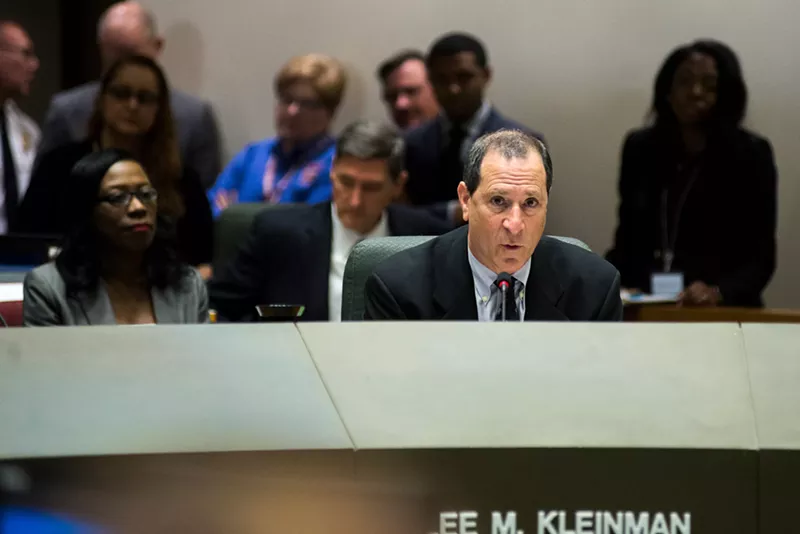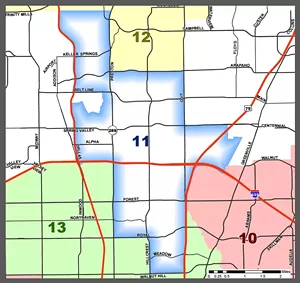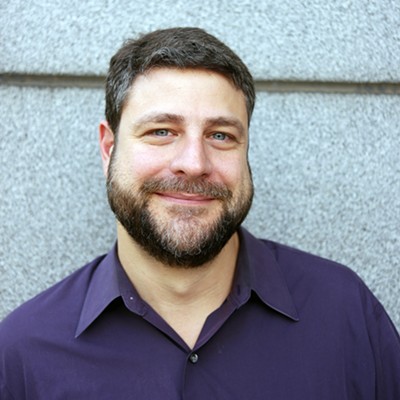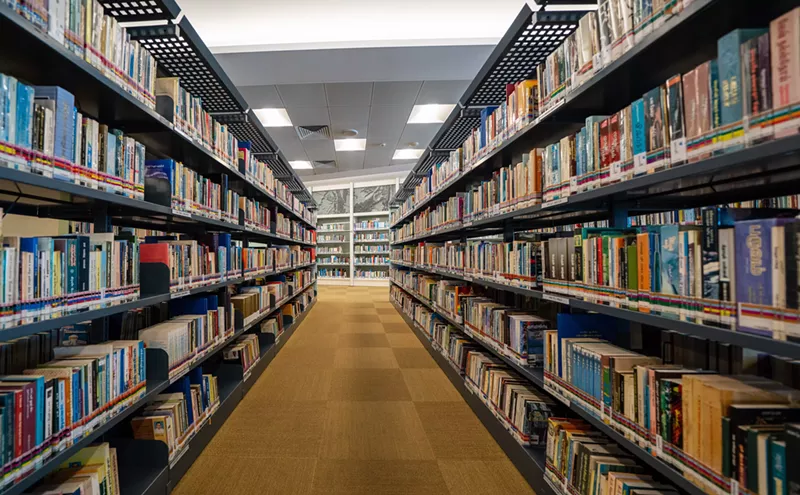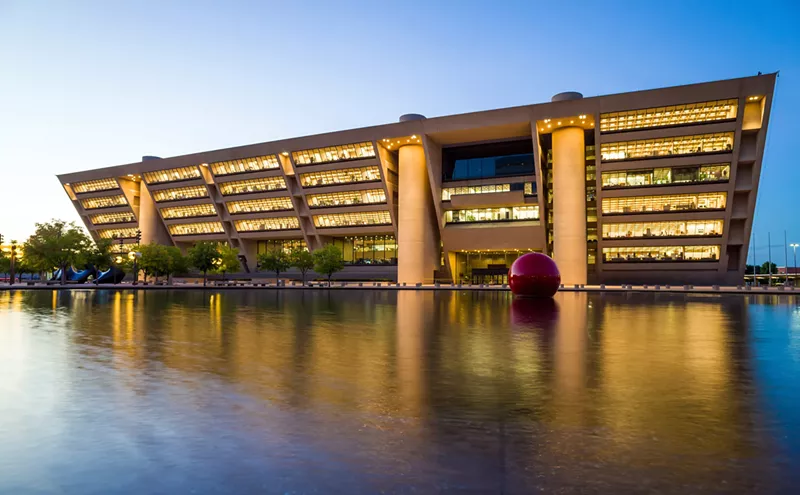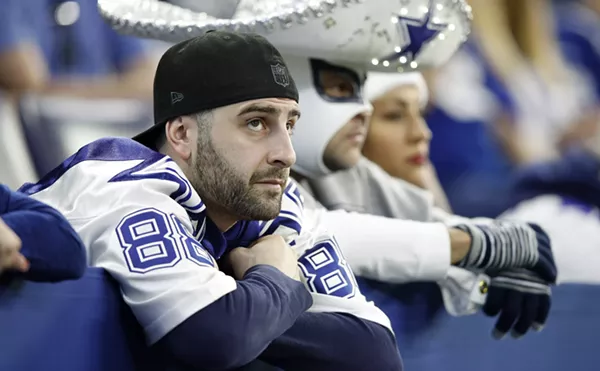Dallas City Councilman Lee Kleinman represents District 11. Last week he sat down with the Dallas Observer to talk about the city police and fire pension crisis, the future of a car-free Dallas, housing in the city and his upcoming election challenge from real estate blogger Candy Evans. Get ready to get wonky.
Dallas Observer: The city’s future seems very much clouded by the troubled police and fire pension, which is billions of dollars in the hole. You were on the pension board for a while; what’s your view on what happened and what’s next?
Lee Kleinman: The pension system is autonomous. It is chartered by the state and statute, not by the city charter, meaning that the state Legislature writes the rules. The city has little or no say and certainly no majority say in what’s going to happen. The city has always paid its contribution, for over 100 years without fail, to the pension system.
Over the years, the pension boards and administrators [made] horrible investments, highly risky investments [with] people’s pension savings. This is the money [officers and fire fighters] are going to live off the rest of their lives, and the board is investing in risky things that most regular investors wouldn’t invest in. In addition, by doing that, they spend a lot of time enhancing the features of the pension system above and beyond the monthly benefit that the city wants to make sure is covered.
I call it egregious enrichment. Literally the board members and the members voted themselves more features. That’s what the DROP is. [The deferred retirement option program allowed police and firefighters who’d served the 20 years to retire on paper but continue working. Their pension contributions would accrue interest at a guaranteed rate somewhere between 8 and 10 percent, an unsustainable amount that has contributed to an unfunded liability of between $3 and $5 billion. – Eds.]
Yes, the city wanted to have a DROP plan, but then it got enhanced. … It wasn’t even put into the statute. The way the statute is written, I believe this may be the only system in the state that has this. The members can actually enhance their own features of the system. They just went off the rails.
How did the creation of DROP benefit the board?
Most board members actually participate in DROP. They do things like a guarantee an interest rate and enable the amount of time you can stay in DROP to be infinite. They allow people that are a tier that’s not eligible for DROP to then start participating in DROP. They are just enhancing to their own stuff. I think it’s a conflict of interest. If you are doing that, what you’re really doing is you’re putting your interest in front of the rest of the members. Especially the members that are not participating in that part of the plan.
That’s one of the challenges that we see so many times in the pension system. Every time there’s a change it typically goes against the younger members, the newer members. Even at times when the pension system recognized, for example, the DROP interest was too high, they were looking to reduce the interest rate, [but] the first thing they did, was make younger members not eligible to participate in parts of that plan. That’s unfortunate because from the city’s perspective, we’re most interested in attracting and retaining officers.
In order to do that we have to have salaries that are competitive. When we end up stuck with a bunch of pension payments, that goes against our ability to pay those salaries. When we look at a system, even what’s proposed right now by the city, it actually restores cost of living adjustments (COLA) to the younger officers, which the system had actually taken away before. That monthly benefit is really important in my view, and that’s what’s called a defined benefit plan. In my view it’s important to maintain that. Public pensions are probably the only pensions left that have defined benefit plans. In the private sector they are virtually all gone.
Is there an inherent problem with defined benefit plans? Are they relics?
Originally these defined benefit plans were based on very low return expectations. Typically, you see in a private pension the assumed rate of return to be only 3 or 4 percent. In public pensions, they can pursue these really high rates of return. The [pension] system had 8.5 percent at one point. They pulled it down to I think, 7.24 percent. The reason given is because you have the taxpayer as the backstop. Whereas a private pension, if the company goes bankrupt, the backstop’s gone, although there is a private pension insurance company.
When they started moving from these very low interest rates and expectations were raised, they started following a model called the foundation model of investing. The idea of a foundation, like for an Ivy League school, is that you invest your money in riskier investments. It first started with just like stock market investments as opposed to the bonds. Then it moved to things like private equity investments, real estate and other riskier investments.
That’s a long way from the low risk of a 10-year U.S. Treasury Bond.
Exactly. You do that because you’re seeking higher returns so that you can ... have more money for grants or for scholarships or things like that. Then the pension system started to follow this foundation model. They started setting higher rates of return and higher expectations and started pursuing riskier investments. The difference is, and the fundamental flaw in that thinking is, in a foundation, if you have a bad year or a couple of bad years, you just don’t make grants. You reduce the amount of scholarships you give, or you don’t give as much to the university. A pension system, without fail, has to make those benefit payments. When you have bad years on a pension system, you actually have to burn down some of the money you’re trying to use to invest, just to make your benefit payments.
When I left that pension system, I pledged to try to maintain this defined benefit for them. All this other stuff that they’ve piled on, that just makes it so much harder. As a matter of fact, with the amount of assets they have right now, I believe they could be long-term sustainable, with their current asset level, if all they had to pay was their benefit and not pay all these other features.
So what comes next?
The city put forth a plan. The plan basically reduces the COLA significantly, gets rid of the DROP interest and restates historical DROP interest. That is how we will jettison a huge amount of liability over there. By doing that, and then the city increasing its contribution, which we’ve said we would do, we can make the system solvent again within 30 years. That’s the direction from the Legislature: Make the system solvent within 30 years. There are two components to it. One is the investment piece of it, which they’re working to straighten out over there. With the exception of their general consultant, they have changed out virtually all their consultants over there or their money managers.
They’re working on the investment side, but the liability side is the other piece. There’s two pieces to every puzzle. We have to get rid of this liability that’s there from these additional features. The city’s position has been and will continue to be [that] the city’s not responsible for that. The city is responsible for the contribution as stated in the statute, and we’ve made it every year. I don’t want this to come across wrong, but the city even saying that we’re going to kick in additional contribution is above and beyond what we’re required to do.
Is that an admission or signal that the city is actually liable?
I don’t think so, because I think that we need to see the taxpayer contribution increase for it to be long-term sustainable. There’s no way we can ask the taxpayer to be hit up for DROP, COLA and all that kind of stuff. … The challenge that we always have in a balanced budget situation [is] if you’re giving from somewhere you’ve got to take from somewhere. The two places to take are from other services or increasing taxes.
We increased police pay, up like $93 million dollars of increase. Now we’re agreeing to increase the pension contribution, another I think $11 or $12 million dollars a year. We’re looking at, on public safety alone, increasing our budget $105 million dollars. That’s on a $1.2 billion dollar general fund budget? We’re going to have 10 percent of our budget is going to be diverted from other services to police and fire."Even staff feels the mire of the bureaucracy that's here. They're eager to improve."
tweet this
And the police and fire departments already get a lot of the budget.
It’s in the low 60s, 62 percent or something like that.
So the city could end up spending more than 70 percent of the budget on the police and fire departments.
Right. That means it’s got to come out of streets, which we’re hearing a lot about how important fixing our streets is. Where it really hurts us, in my view, is if we start reducing hours at libraries and rec centers.
Is public safety the most important thing of the city? Yeah, but people want other stuff too. They want the city to provide other things as well. We constantly get complaints about how high the property taxes are in the city. We have some of the highest property taxes in this North Texas region. We’re an aging city, we have aging infrastructure and the Legislature’s going to limit our ability to raise property taxes. Where’s the money come from?
In light of this, was it a good idea to delay the bond vote scheduled for May?
I think that the main reason we decided to delay the bond program, was because of the degree of uncertainty with the pension system and some degree of uncertainty with the new city manager coming in. It just seemed like there were too many unknowns for the future of this city to go ahead and start issuing yet another $800 million dollars worth of debt, on top of the $2 billion or so that we already have.
If we didn’t have all that $2 billion dollars of debt, we’d actually have $100 million dollars more in our general fund, to be paying for things like streets and libraries and even police. We’re in this kind of credit card situation that’s problematic.
Delaying the bond vote to November, we’ll have a lot more clarity from the Legislature with regards to the pension system, including if we need to include part of the bond program to make a lump sum payment into the pension system. I don’t think that’s a good idea because then we’re going to probably have to raise property taxes in order to do that. There are other solutions out there.
The May bond that we were working on had no money for pension in it. It provided new infrastructure but it was mostly about fixing stuff, so that is “deferred maintenance.” I’m not a fan of using bond money to fix things for deferred maintenance. The reason is, we’ll spend money on a 10-year fix but pay for it for 20 years. That just doesn’t make sense to me.
"In this city a single family home needs to be worth $225,000 to about $250,000 to generate enough tax revenue to pay for the services the family will be using."
tweet this
I think we should be using a general fund to fix the streets, because it’s maintenance. I think we should be increasing our streets budget enough so that we can not only maintain them but actually enhance the quality of our streets. Assistant City Manager Mark McDaniel came up with a plan to do that. It seemed to get pushed to the wayside when we thought we were going to do a bond program.
This city has a terrible history of just deferring maintenance. Borrowing money to fix things, I don’t think is a good use. I don’t see where that increases the value of the city. You’re just fixing an existing piece of infrastructure. Yes, people don’t like having crummy roads. But I haven’t seen that property values in this city have gone down because of our bad roads.
I’ve seen the property values in the city have gone up because of some of the investments, for example, in new streets where we did not have streets before. In new assets like new libraries, new trail systems or other new assets, these do drive property values up. I believe there are areas to use bonding, but it’s not for maintenance. It’s for investment. An investment means you expect a return. Investing in your city means new stuff, and expecting property values to go up because of it.
You say the city has a bad track record with maintenance. You mean the city builds things and doesn’t factor in the money needed to keep them up and running?
[The bond vote in] 2006 is a perfect example of that. We designed a lot of really great stuff that we put on the ground in the city. We put in the Arts District, parks and bridges. All kinds of great new investments. We got so excited about building a beautiful concert hall. We did just think, well we’ll just deal with the maintenance of it later. Now, in the budget, we’re having to pay the price to maintain those and it’s pretty painful. I think staff is a little better now. I know that when we put stuff forward, they do try to show us what the anticipated maintenance is and they try to budget for that.
Streets and trains are on a lot of people’s minds, and you’re the head of the transportation committee at City Hall. What does the future look like for Dallas residents?
We have to look at all the ways to move goods and services and people around in this area. The car is the biggest one that people like to use here. We're not going to be able to maintain that long term, in my view, because of the growth that we’re seeing in North Texas. We expect North Texas to almost double in size in the next 25 to 30 years. Within one generation, we’re going to have almost 12 million people living in the Dallas-Fort Worth area.
As chair of transportation committee, I put our complete streets plan through transportation committee and got it adopted by the council. Our bike plan, put it through the transportation committee and got it adopted by the council. Those were two of the things that were on my list when I became a council member to get done as quickly as possible. We’ve done these studies, and we’ve done these plans, but they’ve never actually been adopted."I frequently tell my constituents, the only way the city's going to grow is up not out."
tweet this
When we adopt them at the council, that tells staff “You will look at these documents when you make decisions on streets. You will look at the bike plan and do what you can to enable the bike plan if you’re fixing the street. You will look at the Complete Streets Guide if you’re rebuilding a neighborhood or rebuilding a street. You’ll look at that guide, and follow the components to it as best as possible.” I think that’s really important. This helps us accomplish creating these nodes of density.
What’s a “node of density”?
The idea is to create an area that people can do everything they need to do without having to get in their car. In midtown, across 460 acres, there’s going to be residential, office, retail, recreational, entertainment, all in that area.
We’re having requirements for sidewalks, landscaping on the sidewalks, building set-back requirements, things like that that will be extremely pedestrian friendly. The people will just want to walk over to a grocery store, want to just walk over to the movie theater. A zone that big will have an internal circulator, so you still don’t have to get your car out of the garage to get from one part of the zone to the other. That is an important component to the way the city’s going to grow.
I frequently tell my constituents the only way the city’s going to grow is up not out. That’s how it’s grown north of downtown. South of downtown we have huge opportunities for single-family housing. We need to get those put in. North of downtown we’re built out; we’re ringed by our suburban neighbors and so we have to build up. Building up is not a threat to the single family paradigm. That’s one thing we have to get our homeowners to feel comfortable with.
Apartments and apartment dwellers are different than they were when a lot of that stuff was built in the ’70s and ’80s. I’ve got some really crummy apartments in my district that need to come down and be replaced with much better apartments where they’re going to get higher rents. A challenge where I am is explaining to people why I support a lot of the development in North Dallas. It’s not a threat to a family home ownership. I try to convince people it’s an enhancement.
Are they receptive?
If you look at what we’re doing Preston Hollow Village, which is a Walnut and at Central, we’ve had a lot of community involvement and how the development’s going to go, but it’s going to end up with 1,300 units in that one parcel. Neighbors have been very, very involved in it. In the end, what they’re getting is they got the first Trader Joe, not the first one in Dallas but the first one in North Dallas. They’ve got a bunch of restaurants in there. They’ve got retail in there. They’ve got all this stuff that is easily adjacent to their community.
The biggest thing that we always hear about is traffic. What do you do about traffic? More density does create traffic, there’s no question. We work hard to mitigate that as best as possible. Sometimes we can’t directly reduce the amount of traffic but maybe we can do other things that basically say the trade-off is you can accept a little bit more traffic but you’re getting retail [and] restaurants you didn’t have there before. It’s kind of that balancing act.
How does DART play into the effort to densify?
DART is densifying Dallas. It is. We have four DART lines that run through downtown. Guess what? We’re going to get people living in downtown without cars at all. What a shock for Dallas. When I grew up, [downtown] Dallas was ghost town after 5:30 p.m. You could race cars down Main Street and nobody would bother you.
People complain about how DART put their trains in the wrong places. DART put the trains where they can put them, which was on existing rail lines. The reason we don’t have train coverage in North Dallas is because the Dallas North Toll Road used to be a rail line, and they turned it into a toll road. Then when DART showed up it was like, “Oh.”
DART’s operational plan is trying to improve that. They have operational bus plan; I think they know it’s urgent. Some people seem to like to bash DART relentlessly. Nationally it’s considered one of the most successful systems out there.
We’ve got to get some of our transit and transportation issues straightened out. I’d love to bring jobs where people live. The reality of it is, we have job centers, so we’ve got to figure out how to get them to the job centers. Everybody wants to beat everybody bloody over this [Trinity River] parkway. If there are people that have jobs in southern Dallas, do we want to make them have to come drive through the core of downtown Dallas to get to those job centers? Would it be better to bring those jobs to southern Dallas? Yeah. Is that going to happen? Not short term. Those are some of the challenges we face.
You’ve got an upcoming election and a challenger. Do you look forward to these?
There are definitely parts of a campaign that I like more than others. I actually like walking neighborhoods and knocking on doors. As a matter of fact, in previous campaigns, if I’d get grumpy or aggravated [doing] fundraising calls, my campaign manager is like, “Just go knock doors, you’ll be a lot happier person.” I’ve always been kind of a people person. I like engaging with people. I like hearing from them. I like fixing their problems. Sometimes you get service requests at the door, which someone didn’t bother calling through on one. As long as you’re there they’re going to tell you about it, you know [you’ll] get it fixed. I enjoy that part of it. It is a distraction for the work that needs to be done here. There’s no question. I have to carve out time to do that. It just comes with the job. It’s just part of doing it.
In some respects it outs concerns in the neighborhoods that maybe you’re not hearing as much when you’re here at City Hall. I had 15 town hall meetings in the last four years. I’ve met with 300 neighborhood associations. I’m try to be engaged, but the campaign outs some issues.
He just got here, but everyone is eager to hear about changes wrought by new City Manager T.C. Broadnax.
I’m excited he’s here. I think that we’ll see some changes here at City Hall. I know some staff is really excited to have him here because they feel like they have not been heard on things they see the ability to improve the city. Even staff feels the mire of the bureaucracy that’s here. They’re eager to improve. There’s probably some staff here that’s probably shaking in their shoes, and if they are they probably need to be.
Can you give some examples?
The dog we like to kick around here a lot is housing. I don’t know if that’s just impossible. I’m really to the point where I think the city needs to consider not being involved in HUD (federal Department of Housing and Urban Development) anymore. Cities like Richardson, they just don’t take any HUD money and just don’t have to deal with all this nonsense. Other areas will see great advancement, like the Center for Performance Excellence, where people go through training to learn how to develop their departments. I think there will be a broader adoption of that. One thing I’ve heard about that department is people go and learn, but then they go back to their respective departments and people there are like, “We don’t want these new ideas.” The message will come down a lot harder that this is how to advance in the city, and you need to get your department on board with that. That’s just holding people accountable.
The quest for affordable housing seems to be a hot-button issue and one that spills over into nearly every other city issue.
That’s some kind of conundrum to me as well. If you look nationally, housing in Dallas is pretty affordable. Nevertheless, there are a lot of people who cannot afford to live in our city. We need to make some policy decisions, based on facts, like how many people [we] have at what levels of affordability living in our city? We are pursuing an affordable house policy without even really knowing the metrics of what the goal is, other than just more affordable housing. That’s just too amorphous for me.
One thing in housing that people don’t think about is in this city a single-family home needs to be worth about $225,000 to about $250,000 to generate enough tax revenue to pay for the services that that family will be using in the city. When we build houses that are less than that, we’ve made a policy decision that we’re going to subsidize the people that are living there. I’m not saying that’s a bad policy decision, but we should be conscious of that policy decision.
It’s the same way for affordable housing in apartments. That’s a little hard to figure out, but probably family [annual] income in the $60,000 to $80,000 range needs to be there. Maybe they’re paying enough taxes through sales tax. Of course, they pay property tax too through their rent to afford the services that the city’s using."We're an aging city. We have aging infrastructure and the Legislature's going to limit our ability to raise property taxes. Where's the money come from?"
tweet this
If all the poverty of North Texas is concentrated in our city, then we are carrying a burden for our suburban neighbors that they’re not carrying. We need policy decisions based on that. I’m not saying we shouldn’t have affordable housing, I’m saying we’ve got to understand where we’re making this policy decision, what we’re signing up to. In housing, there are so many unintended consequences that happen.

